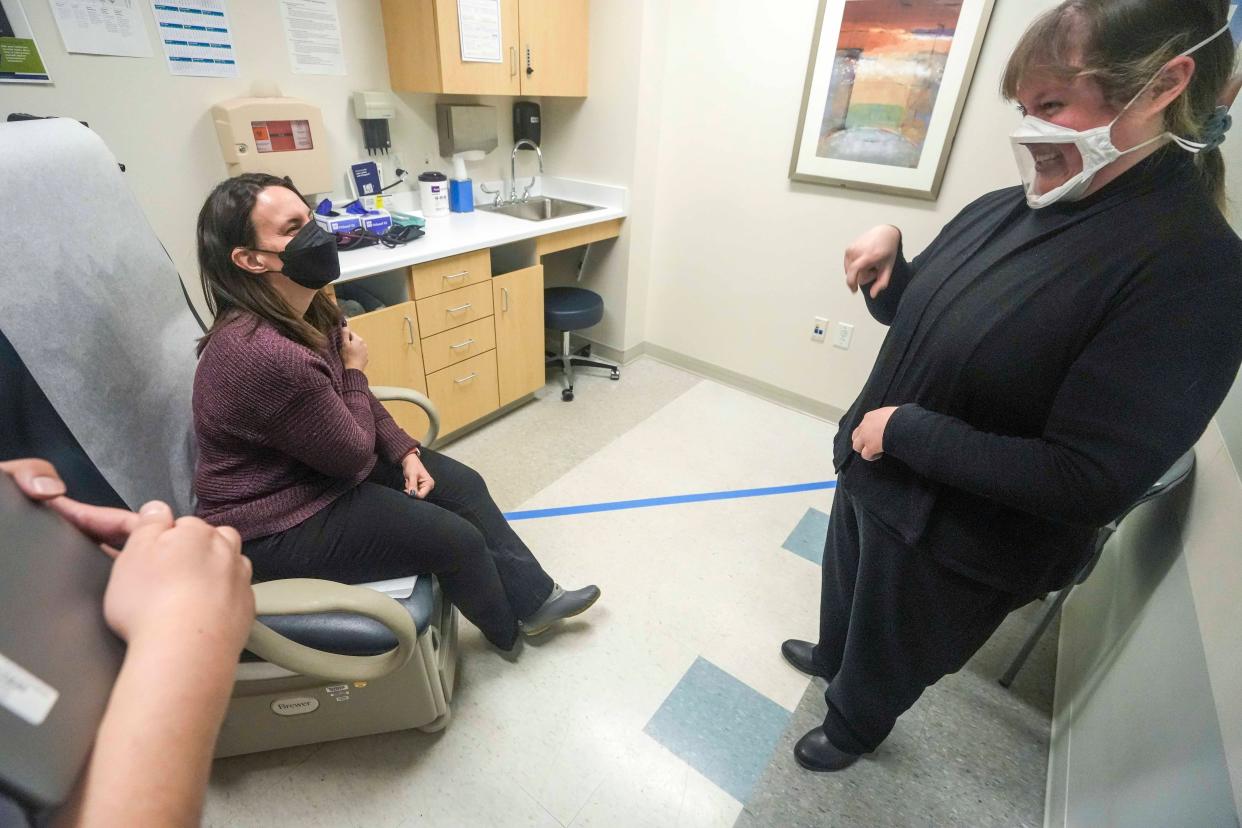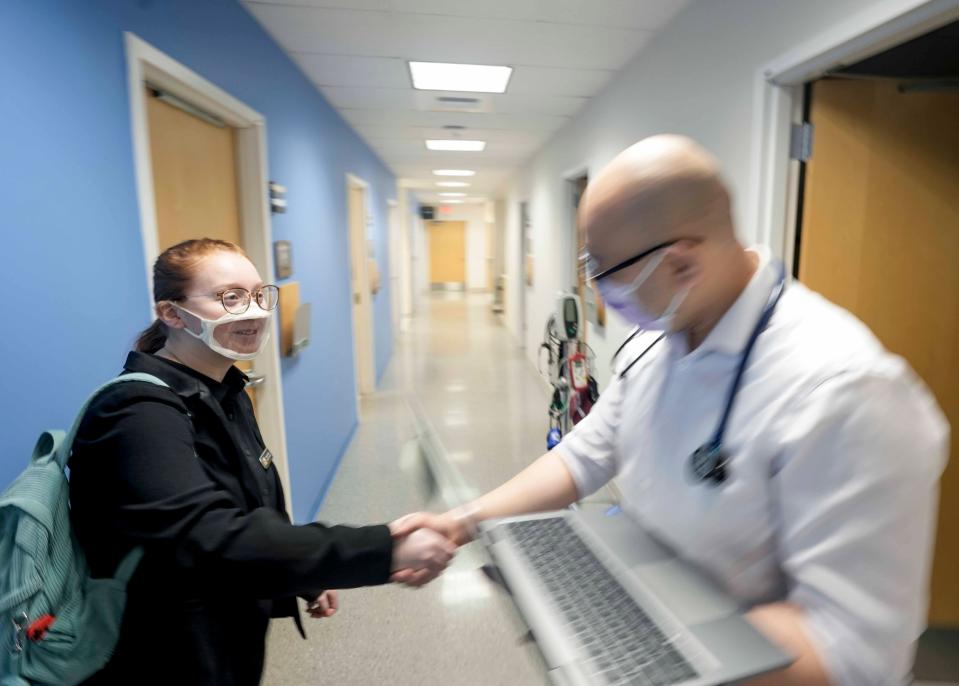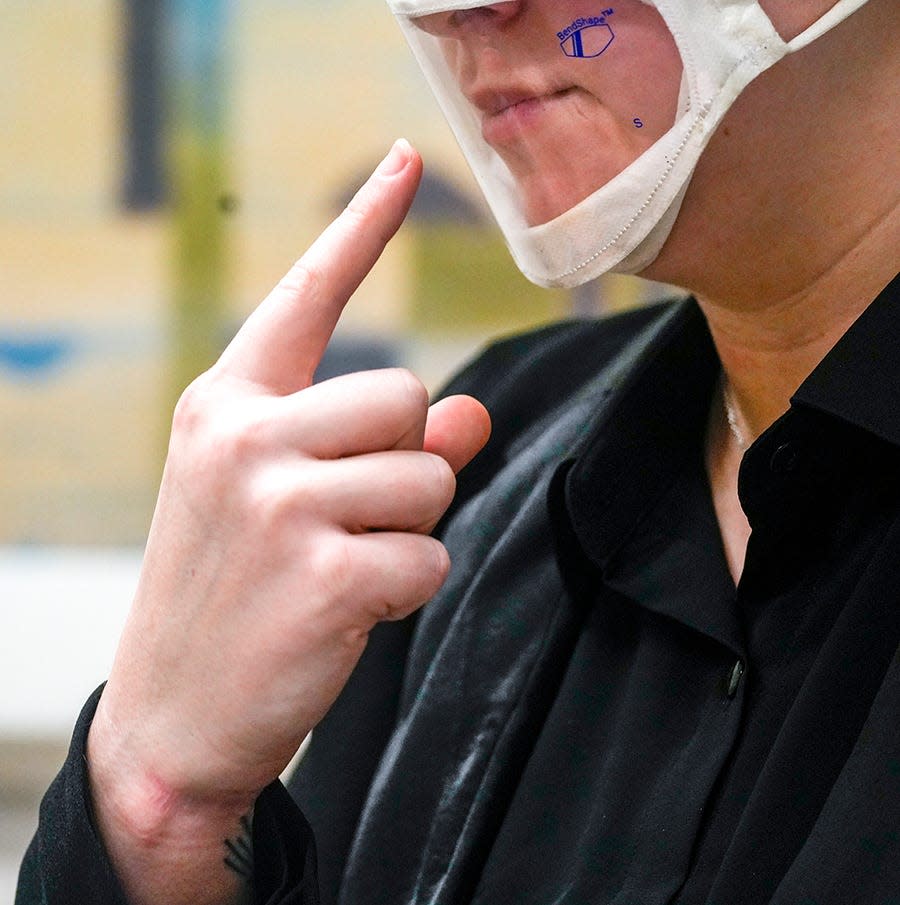Deaf patients don't always have access to an interpreter. A UWM program works to change that.

Jenny Buechner sat on an examination table describing symptoms of dizziness, nausea and shoulder pain.
Across from her was a student interpreter, wearing all black to make hand signs more visible and a clear mask to make lip-reading easier, facilitating a conversation between Buechner and a doctor.
Buechner was born deaf and said that having to seek medical treatment without a qualified American Sign Language interpreter can be nerve-racking, frustrating and sometimes dangerous.
“I have done the writing back and forth with doctors and, man, does that take so long,” Buechner signed to a different interpreter. “There’s misunderstanding, we have to go back and erase and try a new piece of paper, and they just don’t get what I’m trying to say. Then the doctor becomes more intolerant, and then I become angry. It’s just not a good experience. It’s stressful.”
On Friday, eight ASL interpreting students from the University of Wisconsin-Milwaukee got real-world experience interpreting in a medical setting during simulated situations where members of the deaf community posed as patients.
The simulation took place at Ascension Columbia St. Mary’s Milwaukee — Prospect Medical Commons.
UWM is the only school in the state that offers a four-year program for interpreting. The program has been what's known as a sub-major; the Board of Regents in December approved expanding it to a stand-alone bachelor of science degree. The university, in announcing the expansion, said it was in part responding to a growing need.
“If someone interprets wrong, it affects my health,” Buechner said. “The interpretation is crucial, that it’s correct and once we get that interpretation, we’re able to understand clearly what’s happening and (interpreters) have to understand the risk involved in medical interpreting.”
This was the third year that Jackson Nguyen, a family medicine physician with Ascension Medical Group, has assisted in student training, but the first year it’s been done in person due to COVID-19. Jackson’s wife, Karen, is an associate lecturer in UWM’s Interpreter Training Program who teaches the students participating in Friday’s immersion program.

“There’s no deaf country to go to,” Karen Nguyen said. “In a lot of foreign languages, you can go to France or Spain to get language immersion. Here, you really have to make the effort to go out into the community and immerse yourself in their language, in their culture and grow in appreciation for these people that you serve.”
As a son of Vietnamese immigrants, Jackson Nguyen has a particular interest in helping underserved communities and knows what it can be like to navigate healthcare when there are communication barriers.
“Growing up, I would have to interpret for my parents speaking Vietnamese, and as a kid you really don’t want to interpret,” he said. “When you’re talking to a doctor, there can be a lot lost in translation.”
For Buechner, who is also the president of the National Association for the Deaf, participating in this program helps fulfill the association’s commitment to advocacy and moving towards a world where all deaf patients can have access to a qualified interpreter while seeking healthcare.
“I just feel relaxed when I know that the interpreter is qualified, they’re experienced especially in medical terminology and the environment,” Buechner said. “Professional interpreters understand the cultural mediation that’s required in a medical setting and they can actually help moderate that environment with the doctor, the nurse, myself.”
While bigger hospitals in urban areas more frequently have qualified interpreters available, that’s not always the case in more rural areas, according to Buechner.
UWM expands interpreting program
The four-year program at UWM has graduated more than 300 students since 1993, the university said in a press release. In the new stand-alone major, students will take six levels of ASL, deaf history and deaf culture, among other courses, according to UWM documents, but field work is the most important part of the major, Karen said.
“You can give them ethical scenarios on paper, you can give them group work, you can give them case studies,” Karen said. “All of that’s great until you get into the real world and all of the sudden, you’re trying to take all this information and apply it to your appointment.”

Morgan Inches is a student in UWM’s ASL program. As someone who was born into a deaf family, Inches said she wanted to work with the deaf community for the rest of her life, moving to Wisconsin from Michigan to enroll in UWM’s program.
“ASL was my first language. I realized at a young age it was a community that I never wanted to leave,” Inches said.
The bachelor’s degree is required in order to be eligible for national certification testing, according to UWM’s School of Education.
The U.S. Department of Labor says employment of interpreters and translators is projected to grow 24% from 2020 to 2030, according to UWM, much faster than the average for all occupations. ASL interpreters are particularly sought after, according to the Bureau. Graduates can work in medicine, law, mental health, government, human resources, theater and entertainment.
The deaf population in the U.S. is around 37 million, compared to 15,500 certified ASL interpreters, according to Discover Interpreting, an organization aimed at increasing the number of certified interpreters.
Having a qualified, certified interpreter available in every healthcare facility is what would be ideal for the deaf community, according to Buechner.
“I worry if the interpreter or doctor will understand me, will I be clear?" she said. "Once I know that a qualified medical interpreter is there, I feel so relieved.”
This article originally appeared on Milwaukee Journal Sentinel: UWM students get real-world experience interpreting for deaf patients

